The Katanning Landcare Centre organised a bus trip for farmers to visit Mingenew-Irwin Group (MIG) to view some of their outstanding work in Perennial Pastures and Pasture Cropping. The goal was to learn some of the principals of Perennial Pasture management in real-life settings, and ways that perennials can be brought into existing farming systems.
The tour ran from 25
th-27
th March 2014 and was funded through a Caring for our Country grant through the federal government.
Day 1 – Drive Up
This was just a relaxing trip up, and a chance for people to chat and get to know one another better.
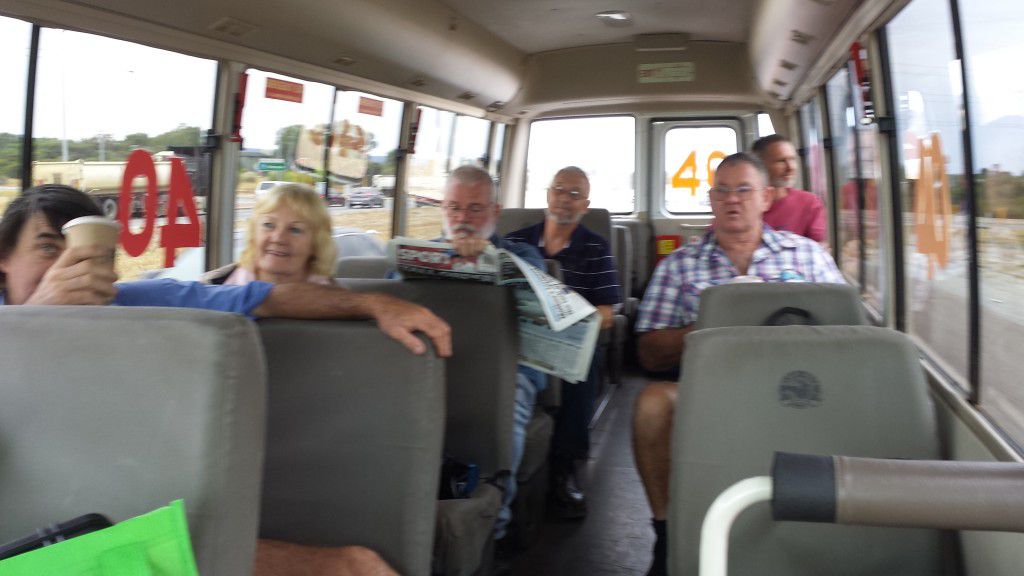
Thanks to Mat Tuffin for being a courteous and efficient driver for the event. Although he’s usually busy with his welding business “Tuffin Diverse,” he could certainly have a second career in coach driving if he ever wanted to make that switch.
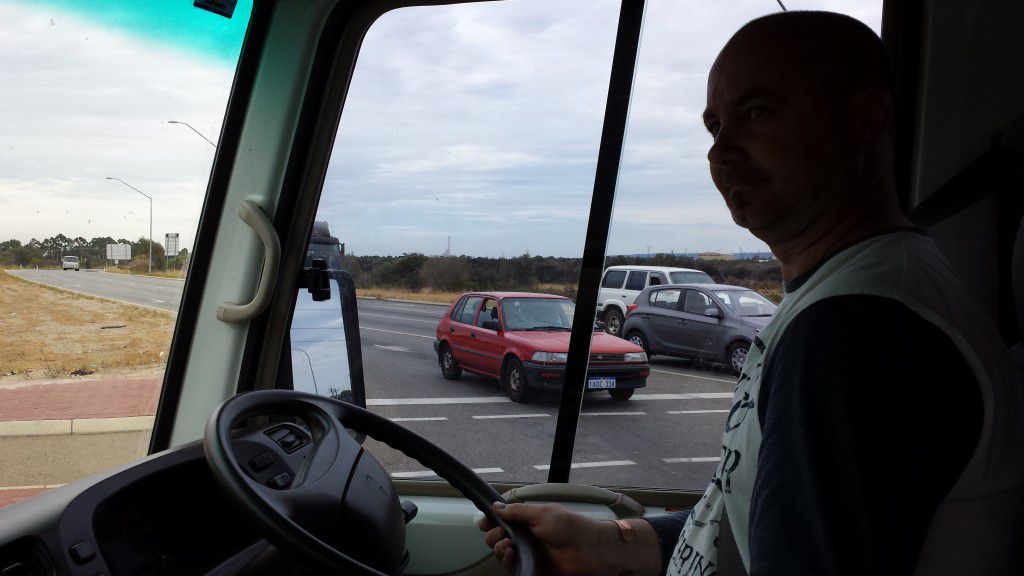
The food and accommodation was really good. I’ve added a list of places we’ve been and want to give special mention to the staff at Southerlys Harbour View Restaurant in Port Denison, who were outstanding, professional and polite. If you’re ever in the area, I can’t recommend them enough.
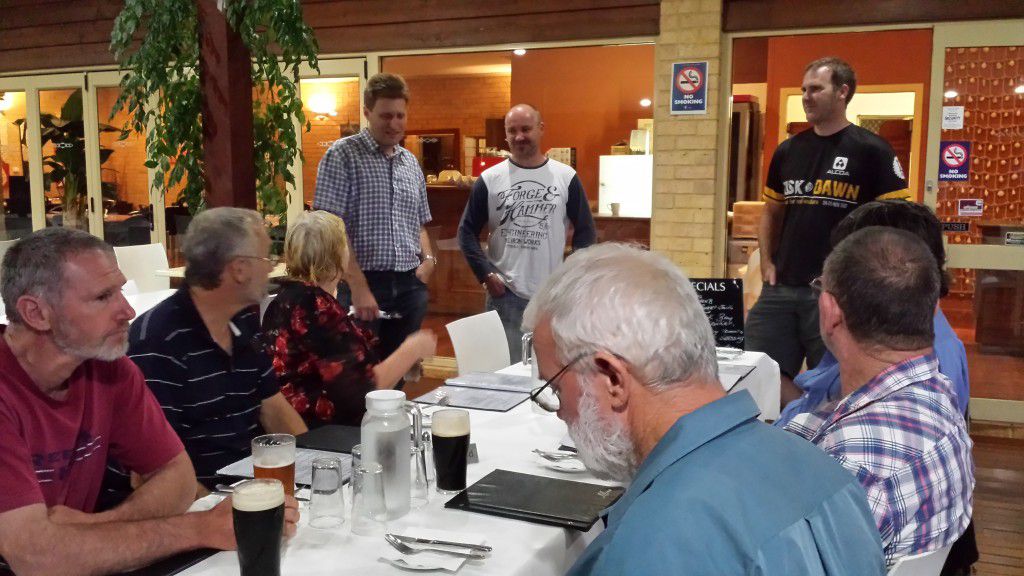 Day 2 – The Tour Begins
Day 2 – The Tour Begins
We started with breakfast at the beach, a real treat for us, and then met up with Helene Metzinger from
Mingenew-Irwin Group (MIG) who directed us to our sites for the day.
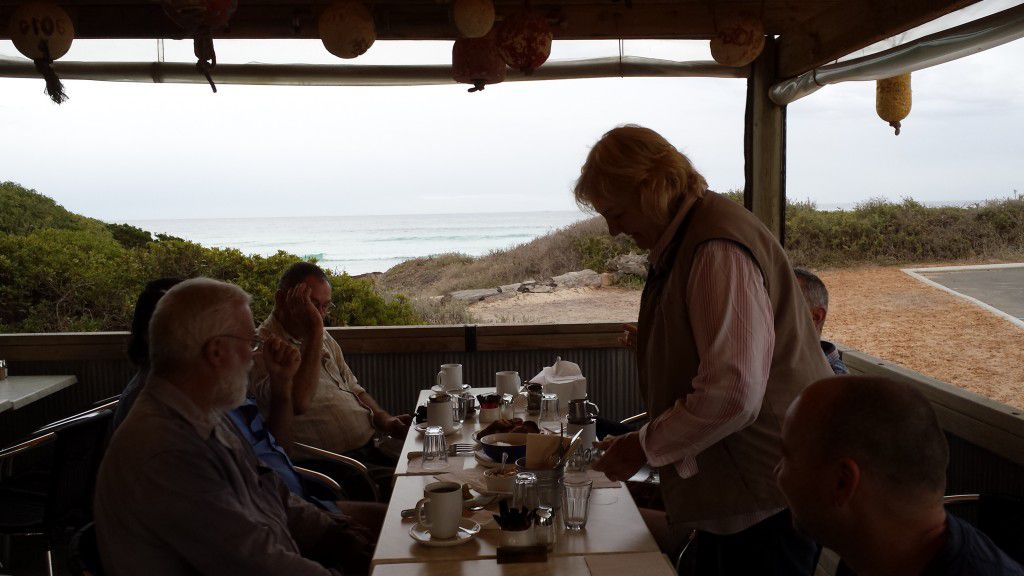
Our first site was Andrew and Debbie Gillam’s Perennial Cropping Trial site, where we first learned about the principles of Perennial Cropping and some of the challenges that go with it. David Ferris and Christiaan Valentine from
Department of Agriculture and Food WA (DAFWA) helped inform us about this trial, and joined us for the rest of the tour as well.
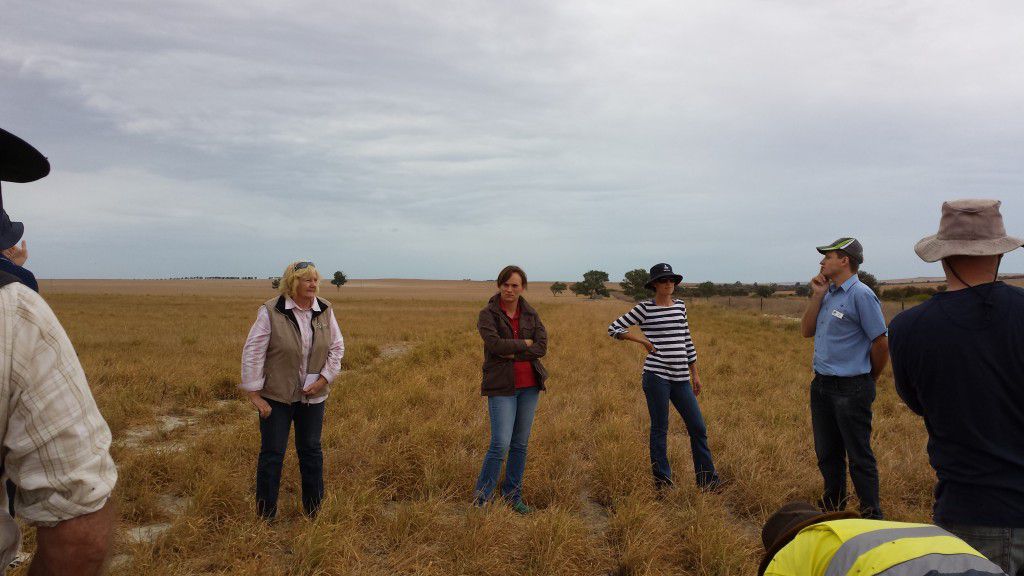
Our second site was a real favourite amongst our tour: Craig Forsyth’s 100% stocking operation, focusing on cattle, using 100% perennial pastures for feed. His processes and systems were very eye-opening and tour members were fascinated by his watering system, including his mineral delivery, and especially his rhagodia and tagasaste paddocks.
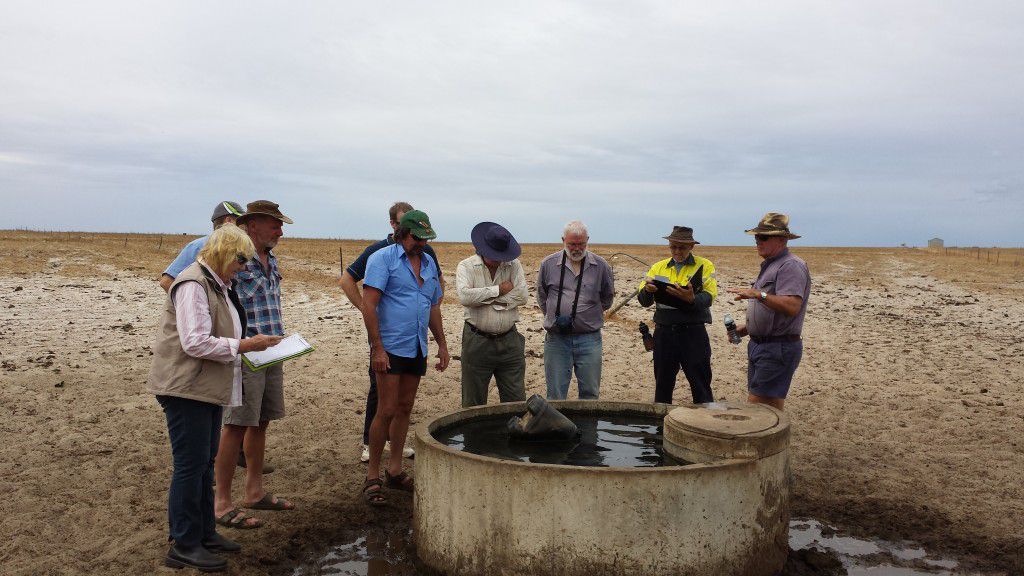
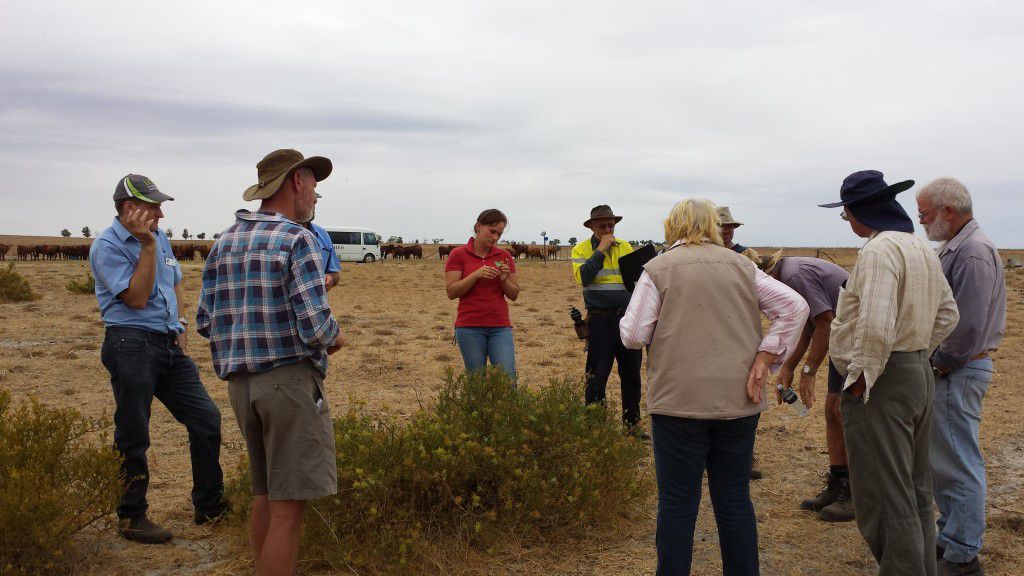
We had a working lunch at the MIG office where we got to play with some new software developed by Evercrop and DAFWA to look at Perennial Cropping outcomes. Although predictive software has some limitations, and requires very thoughtful input, the idea behind it was pretty neat, and everyone had a chance to work with a system they haven’t seen before.
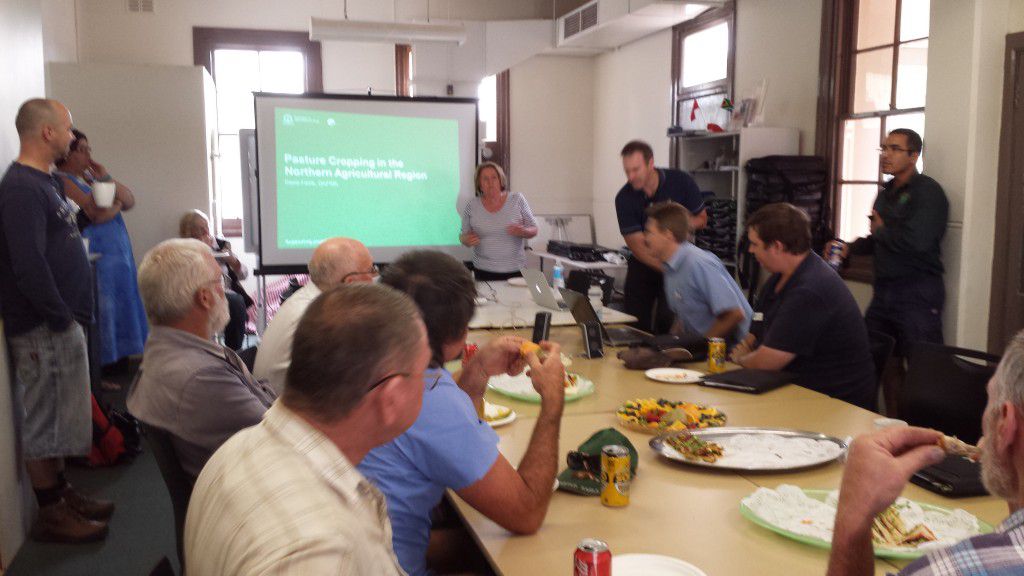
After lunch we headed to Donald Heitman’s and took a quick look at his Perennial Pastures and had some afternoon tea as we sheltered from the
rain! There wasn’t much, but it was the first mists of rain in four months, so that was pretty neat.
It really struck me how the perennials persist in very harsh dry weather, with only sand on sand! There were still hints of green, despite the lack of wet, and sand doesn’t hold much moisture!
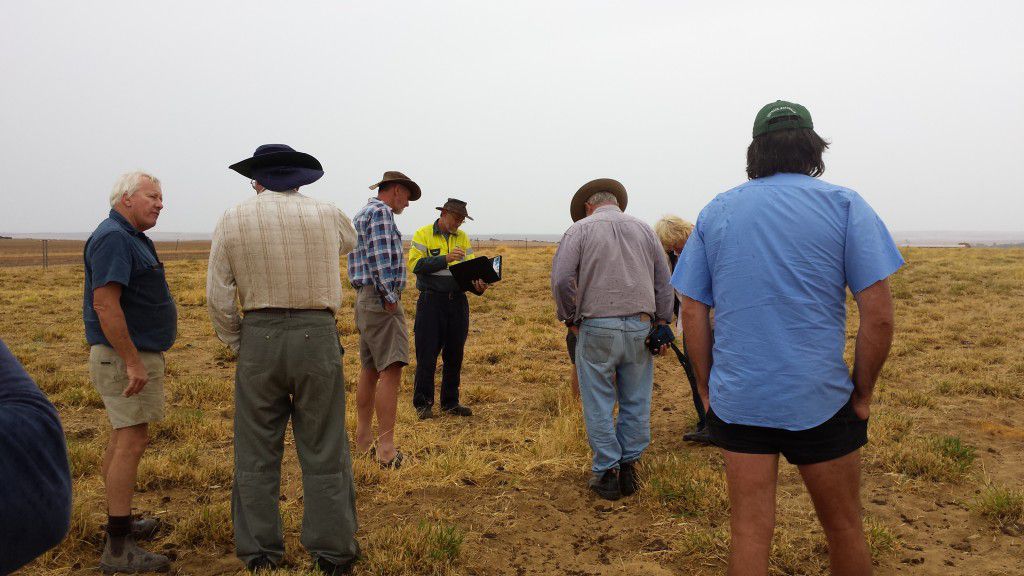
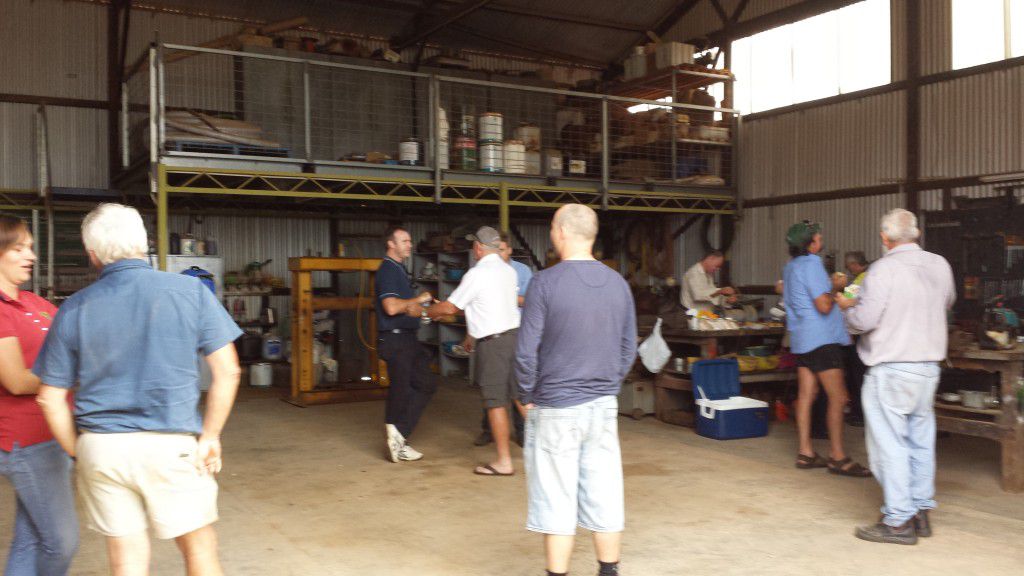
On the way home, we stopped at the estuary for a quick view, and then a few hours of respite before heading to dinner with everyone we met during the day!
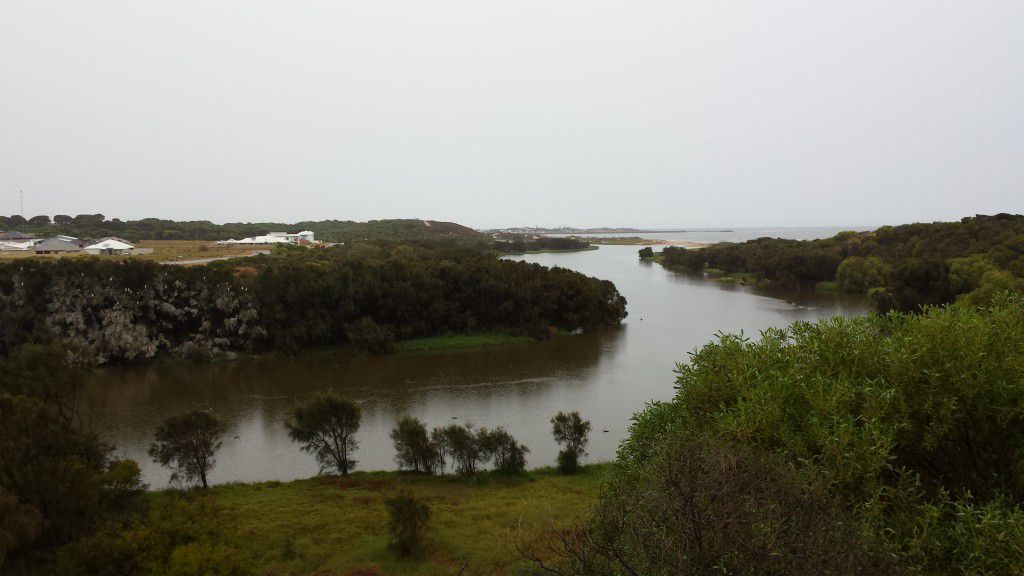
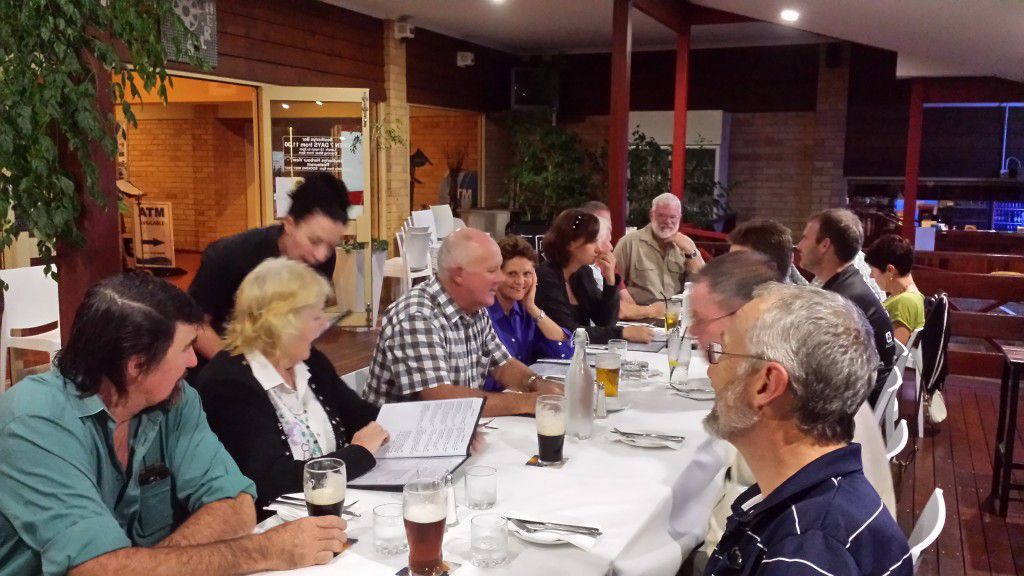
It was nice to have that time to chat with the farmers on a one-on-one level, and really pick their brains, and just generally get to know them better!
Then off to bed for another early start.
Day 3 – Homeward Bound
Once again, we enjoyed breakfast at the beach, and then hit the road for the West-Midlands site in Dandaragan.
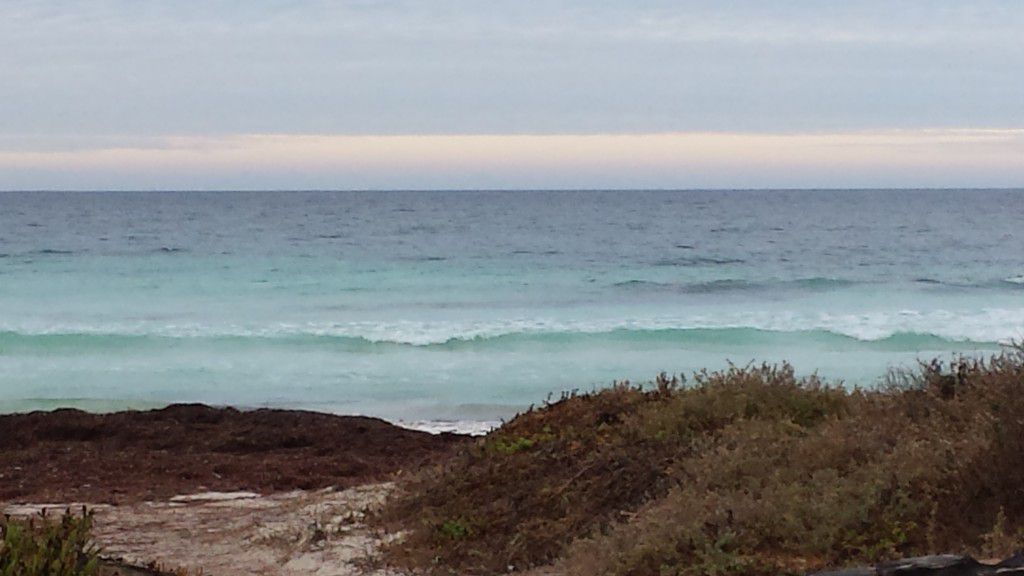
Here, we met up with Anne and Jennifer from
West-Midlands, David and Christiaan, and Geoff Moore from DAFWA again. The site, another Perennial Cropping Trial, was very interesting, but more interesting was the
specific knowledge and advice provided by Geoff Moore about perennials establishment, equipment variations for perennial cropping, what to grow in our region, and how we can try to get involved in Perennial Cropping trails in our area.
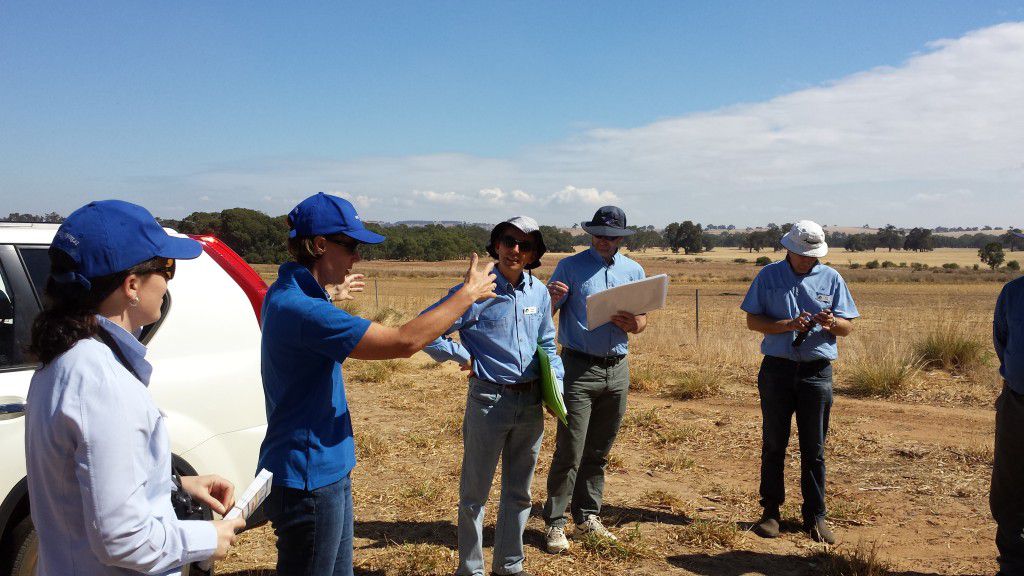
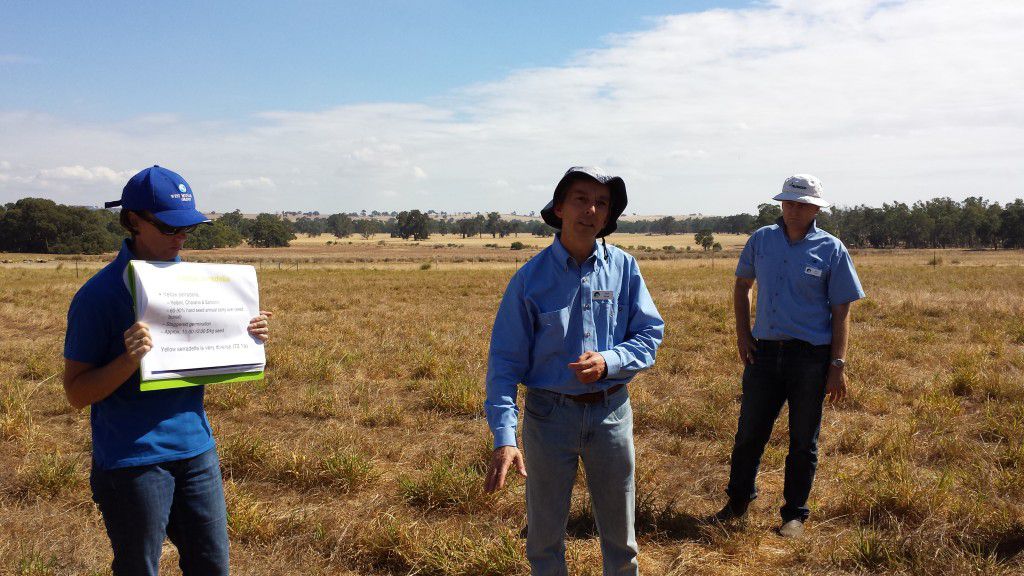
And he discussed his serradella trials, and gave us some great insight into hard and soft podded varieties, and their relative benefits.
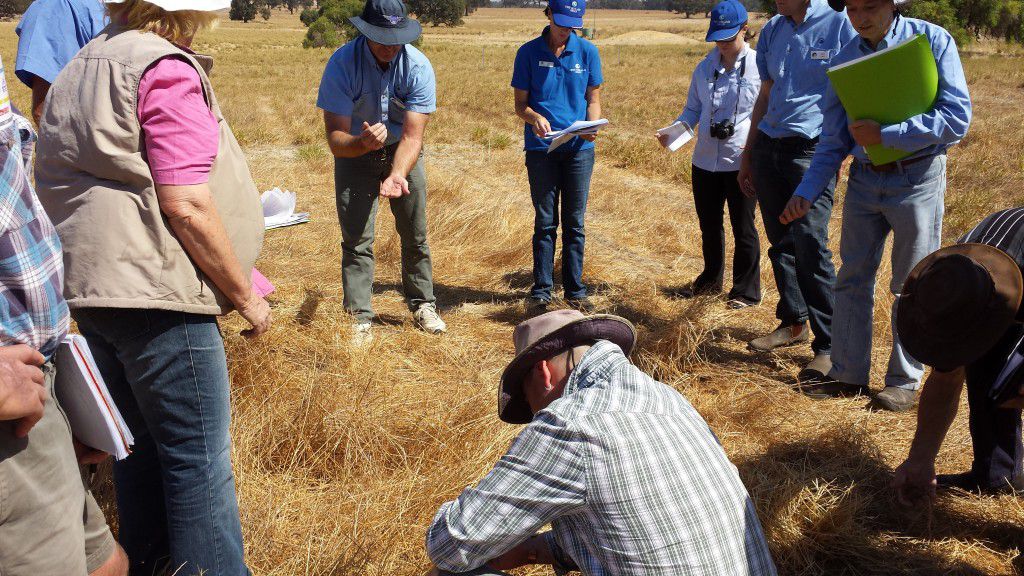
Some of the specific advice for our region I gleaned from this site relating to perennial pasture establishment was:
- Start with some saltbush varieties
- Get in some messina (salt tolerant annual legume (http://en.wikipedia.org/wiki/Melilotus)), with tall wheat grass
- Grazer Lucerne is a good variety for our region
- Tedera, when available will be a good choice (http://www.futurefarmonline.com.au/research/future-cropping-systems/tedera.htm)
- Velt Grass and Tall Fescue are other good temperate perennial grasses
- Avoid, or only put in for limited persistence sub-tropical grasses and tagasaste
DAFWA have videos and piles of information on their website about perennials, perennial cropping, and establishment of pastures. Check out their page at:
https://www.agric.wa.gov.au/.
Some of the big take-away’s from the event, from our farmer’s mouths:
- Most were amazed at the rhegodia and the potential use of it in our systems. Use of native shrubs as fodder and protection of livestock has huge potential here. Must follow up with MIG on their upcoming fodder shrub trials.
- There was a good mix of perennials and the way they are used, across the board.
- Sub-tropicals are not necessarily suited to our climate, but there are other great options.
- The farming systems of Craig and Donald were great. Thoughtful establishment shows that soil regeneration and persistence over long period (10-12 years) with minimal additional inputs.
- Sustainable farming can be done with reduced inputs and risks. It’s good to look at alternate systems to maintain farm viability.
- Mineral dispenser and ring pressure watering system were very interesting!
Restaurants and suppliers along the way:
 Thanks to Mat Tuffin for being a courteous and efficient driver for the event. Although he’s usually busy with his welding business “Tuffin Diverse,” he could certainly have a second career in coach driving if he ever wanted to make that switch.
Thanks to Mat Tuffin for being a courteous and efficient driver for the event. Although he’s usually busy with his welding business “Tuffin Diverse,” he could certainly have a second career in coach driving if he ever wanted to make that switch.
 The food and accommodation was really good. I’ve added a list of places we’ve been and want to give special mention to the staff at Southerlys Harbour View Restaurant in Port Denison, who were outstanding, professional and polite. If you’re ever in the area, I can’t recommend them enough.
The food and accommodation was really good. I’ve added a list of places we’ve been and want to give special mention to the staff at Southerlys Harbour View Restaurant in Port Denison, who were outstanding, professional and polite. If you’re ever in the area, I can’t recommend them enough.
 Day 2 – The Tour Begins
We started with breakfast at the beach, a real treat for us, and then met up with Helene Metzinger from Mingenew-Irwin Group (MIG) who directed us to our sites for the day.
Day 2 – The Tour Begins
We started with breakfast at the beach, a real treat for us, and then met up with Helene Metzinger from Mingenew-Irwin Group (MIG) who directed us to our sites for the day.
 Our first site was Andrew and Debbie Gillam’s Perennial Cropping Trial site, where we first learned about the principles of Perennial Cropping and some of the challenges that go with it. David Ferris and Christiaan Valentine from Department of Agriculture and Food WA (DAFWA) helped inform us about this trial, and joined us for the rest of the tour as well.
Our first site was Andrew and Debbie Gillam’s Perennial Cropping Trial site, where we first learned about the principles of Perennial Cropping and some of the challenges that go with it. David Ferris and Christiaan Valentine from Department of Agriculture and Food WA (DAFWA) helped inform us about this trial, and joined us for the rest of the tour as well.
 Our second site was a real favourite amongst our tour: Craig Forsyth’s 100% stocking operation, focusing on cattle, using 100% perennial pastures for feed. His processes and systems were very eye-opening and tour members were fascinated by his watering system, including his mineral delivery, and especially his rhagodia and tagasaste paddocks.
Our second site was a real favourite amongst our tour: Craig Forsyth’s 100% stocking operation, focusing on cattle, using 100% perennial pastures for feed. His processes and systems were very eye-opening and tour members were fascinated by his watering system, including his mineral delivery, and especially his rhagodia and tagasaste paddocks.

 We had a working lunch at the MIG office where we got to play with some new software developed by Evercrop and DAFWA to look at Perennial Cropping outcomes. Although predictive software has some limitations, and requires very thoughtful input, the idea behind it was pretty neat, and everyone had a chance to work with a system they haven’t seen before.
We had a working lunch at the MIG office where we got to play with some new software developed by Evercrop and DAFWA to look at Perennial Cropping outcomes. Although predictive software has some limitations, and requires very thoughtful input, the idea behind it was pretty neat, and everyone had a chance to work with a system they haven’t seen before.
 After lunch we headed to Donald Heitman’s and took a quick look at his Perennial Pastures and had some afternoon tea as we sheltered from the rain! There wasn’t much, but it was the first mists of rain in four months, so that was pretty neat.
It really struck me how the perennials persist in very harsh dry weather, with only sand on sand! There were still hints of green, despite the lack of wet, and sand doesn’t hold much moisture!
After lunch we headed to Donald Heitman’s and took a quick look at his Perennial Pastures and had some afternoon tea as we sheltered from the rain! There wasn’t much, but it was the first mists of rain in four months, so that was pretty neat.
It really struck me how the perennials persist in very harsh dry weather, with only sand on sand! There were still hints of green, despite the lack of wet, and sand doesn’t hold much moisture!

 On the way home, we stopped at the estuary for a quick view, and then a few hours of respite before heading to dinner with everyone we met during the day!
On the way home, we stopped at the estuary for a quick view, and then a few hours of respite before heading to dinner with everyone we met during the day!

 It was nice to have that time to chat with the farmers on a one-on-one level, and really pick their brains, and just generally get to know them better!
Then off to bed for another early start.
Day 3 – Homeward Bound
Once again, we enjoyed breakfast at the beach, and then hit the road for the West-Midlands site in Dandaragan.
It was nice to have that time to chat with the farmers on a one-on-one level, and really pick their brains, and just generally get to know them better!
Then off to bed for another early start.
Day 3 – Homeward Bound
Once again, we enjoyed breakfast at the beach, and then hit the road for the West-Midlands site in Dandaragan.
 Here, we met up with Anne and Jennifer from West-Midlands, David and Christiaan, and Geoff Moore from DAFWA again. The site, another Perennial Cropping Trial, was very interesting, but more interesting was the specific knowledge and advice provided by Geoff Moore about perennials establishment, equipment variations for perennial cropping, what to grow in our region, and how we can try to get involved in Perennial Cropping trails in our area.
Here, we met up with Anne and Jennifer from West-Midlands, David and Christiaan, and Geoff Moore from DAFWA again. The site, another Perennial Cropping Trial, was very interesting, but more interesting was the specific knowledge and advice provided by Geoff Moore about perennials establishment, equipment variations for perennial cropping, what to grow in our region, and how we can try to get involved in Perennial Cropping trails in our area.

 And he discussed his serradella trials, and gave us some great insight into hard and soft podded varieties, and their relative benefits.
And he discussed his serradella trials, and gave us some great insight into hard and soft podded varieties, and their relative benefits.
 Some of the specific advice for our region I gleaned from this site relating to perennial pasture establishment was:
Some of the specific advice for our region I gleaned from this site relating to perennial pasture establishment was:

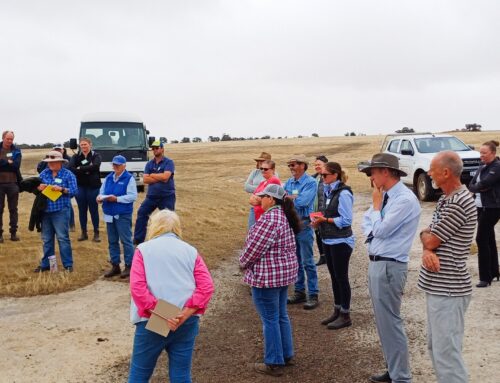
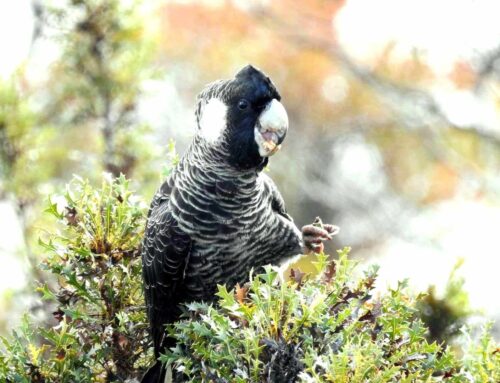
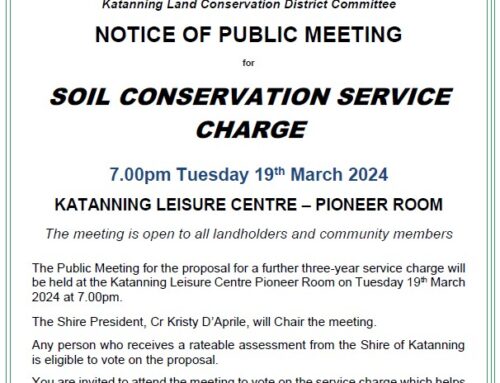
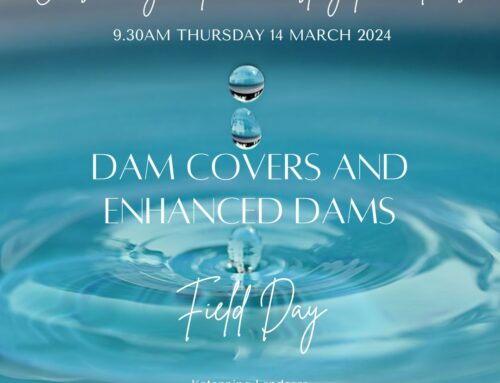
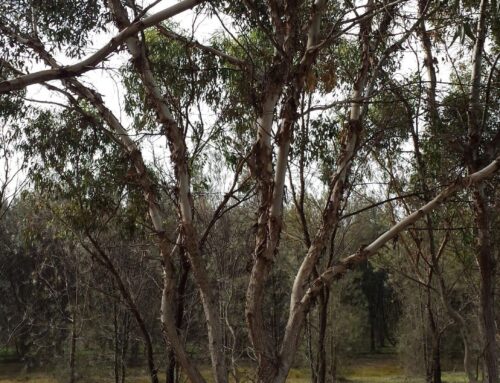
Leave A Comment